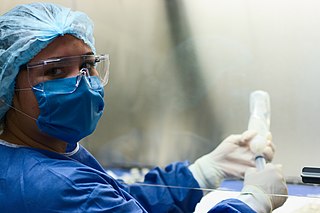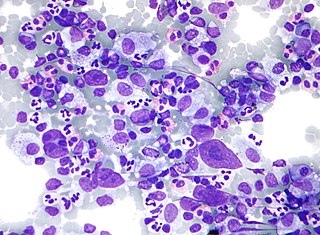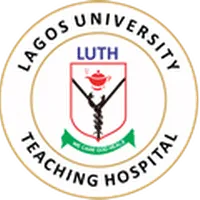Related Research Articles

Radiation therapy or radiotherapy is a treatment using ionizing radiation, generally provided as part of cancer therapy to either kill or control the growth of malignant cells. It is normally delivered by a linear particle accelerator. Radiation therapy may be curative in a number of types of cancer if they are localized to one area of the body, and have not spread to other parts. It may also be used as part of adjuvant therapy, to prevent tumor recurrence after surgery to remove a primary malignant tumor. Radiation therapy is synergistic with chemotherapy, and has been used before, during, and after chemotherapy in susceptible cancers. The subspecialty of oncology concerned with radiotherapy is called radiation oncology. A physician who practices in this subspecialty is a radiation oncologist.
A radiation oncologist is a specialist physician who uses ionizing radiation in the treatment of cancer. Radiation oncology is one of the three primary specialties, the other two being surgical and medical oncology, involved in the treatment of cancer. Radiation can be given as a curative modality, either alone or in combination with surgery and/or chemotherapy. It may also be used palliatively, to relieve symptoms in patients with incurable cancers. A radiation oncologist may also use radiation to treat some benign diseases, including benign tumors. In some countries, radiotherapy and chemotherapy are controlled by a single oncologist who is a "clinical oncologist". Radiation oncologists work closely with other physicians such as surgical oncologists, interventional radiologists, internal medicine subspecialists, and medical oncologists, as well as medical physicists and technicians as part of the multi-disciplinary cancer team. Radiation oncologists undergo four years of oncology-specific training whereas oncologists who deliver chemotherapy have two years of additional training in cancer care during fellowship after internal medicine residency in the United States.
A radiation therapist, therapeutic radiographer or radiotherapist is an allied health professional who works in the field of radiation oncology. Radiation therapists plan and administer radiation treatments to cancer patients in most Western countries including the United Kingdom, Australia, most European countries, and Canada, where the minimum education requirement is often a baccalaureate degree or postgraduate degrees in radiation therapy. Radiation therapists can also prescribe medications and radiation, interpret tests results, perform follow ups, reviews, and provide consultations to cancer patients in the United Kingdom and Ontario, Canada . In the United States, radiation therapists have a lower educational requirement and often require postgraduate education and certification in order to plan treatments.

In medicine, proton therapy, or proton radiotherapy, is a type of particle therapy that uses a beam of protons to irradiate diseased tissue, most often to treat cancer. The chief advantage of proton therapy over other types of external beam radiotherapy is that the dose of protons is deposited over a narrow range of depth; hence in minimal entry, exit, or scattered radiation dose to healthy nearby tissues.

An oncology nurse is a specialized nurse who cares for cancer patients. These nurses require advanced certifications and clinical experiences in oncology further than the typical baccalaureate nursing program provides. Oncology nursing care can be defined as meeting the various needs of oncology patients during the time of their disease including appropriate screenings and other preventive practices, symptom management, care to retain as much normal functioning as possible, and supportive measures upon end of life.

The Tata Memorial Hospital is situated in Parel, Mumbai, in India. Also popularly known as TMH. It is one of the 62 specialist cancer treatment and research centres in India. It is closely associated with the Advanced Centre for Treatment, Research and Education in Cancer (ACTREC). The centre is the national comprehensive cancer centre for the prevention, treatment, education and research in cancer, and is recognised as one of the leading cancer centres in this part of the world. It is an autonomous body funded and controlled by Department of Atomic Energy, Government of India which also oversees the administration of the institute since 1962.
Shaukat Khanum Memorial Cancer Hospital and Research Centre(Urdu: یادگاری اسپتالِ شوکت خانم برائے معالجہ و تحقیقِ سرطان, abbreviated as SKMCH&RC/SKMCH) is a cancer centre with locations in Lahore and Peshawar, Pakistan. It is the first project of the Shaukat Khanum Memorial Trust, a charitable organization established under the Societies Registration Act XXI of 1858 of British India. It is Pakistan's largest tertiary care hospital.
In 1916, the Daughters of Charity of Saint Vincent de Paul launched a Catholic hospital called St. Vincent's Medical Center Riverside. They provide full-service tertiary care at a capacity of 528 beds.

The Regional Cancer Centre (RCC) at Thiruvananthapuram is a cancer care hospital and research centre. RCC was established in 1981 by the Government of Kerala and the Government of India. It is located in the Thiruvananthapuram Medical College campus in Thiruvananthapuram, the capital city of the state of Kerala. It was established as an expansion of the Radiation Therapy / Radiotherapy department of Medical College Trivandrum. It is a tertiary care center for the managements of all types of cancers. The clinics are mainly on Haematology, Lymphoreticular, soft tissue, bone, head and neck, breast, CNS, gynaecological, urinary, chest, gastro, paediatric oncology and thyroid.

Cobalt therapy is the medical use of gamma rays from the radioisotope cobalt-60 to treat conditions such as cancer. Beginning in the 1950s, cobalt-60 was widely used in external beam radiotherapy (teletherapy) machines, which produced a beam of gamma rays which was directed into the patient's body to kill tumor tissue. Because these "cobalt machines" were expensive and required specialist support, they were often housed in cobalt units. Cobalt therapy was a revolutionary advance in radiotherapy in the post-World War II period but is now being replaced by other technologies such as linear accelerators.

Oncology is a branch of medicine that deals with the study, treatment, diagnosis, and prevention of cancer. A medical professional who practices oncology is an oncologist. The name's etymological origin is the Greek word ὄγκος (ónkos), meaning "tumor", "volume" or "mass". Oncology is concerned with:

Hodgkin lymphoma (HL) is a type of lymphoma in which cancer originates from a specific type of white blood cell called lymphocytes, where multinucleated Reed–Sternberg cells are present in the patient's lymph nodes. The condition was named after the English physician Thomas Hodgkin, who first described it in 1832. Symptoms may include fever, night sweats, and weight loss. Often, nonpainful enlarged lymph nodes occur in the neck, under the arm, or in the groin. Persons affected may feel tired or be itchy.
Gregory Bruce Mann is an Australian surgical oncologist.

The Clatterbridge Cancer Centre is an NHS Foundation Trust, which specialises in the treatment of cancer. The centre is one of several specialist hospitals located within Merseyside; alongside Liverpool Heart and Chest Hospital, Alder Hey Children's Hospital, Liverpool Women's Hospital, and the Walton Centre.

Lagos University Teaching Hospital (LUTH) is a tertiary hospital established in 1961 and is located in Idi-Araba, Surulere, Lagos State, the administrative division of Nigeria. The teaching hospital affiliated with the University of Lagos College of Medicine established in 1962. The University of Lagos College of Medicine educates students and LUTH provides them with experience through placement and work experience.

Pramod Kumar Julka, is an Indian cancer specialist (oncologist), medical educationist and writer, known for performing the first peripheral blood stem cell transplant following high dose chemotherapy in Metastatic Breast Cancer in India. He was honoured by the Government of India, in 2013, by bestowing on him the Padma Shri, the fourth highest civilian award, for his contributions to the fields of medicine and medical education. The American Society of Clinical Oncology (ASCO) has awarded him by bestowing on him the honorary membership.
The Karachi Institute of Radiotherapy and Nuclear Medicine (KIRAN) is a cancer hospital in Karachi, Pakistan under the administrative control of the Pakistan Atomic Energy Commission. KIRAN is one of nineteen medical centers in Pakistan providing patients access to diagnostic and treatment facilities either free of charge or at subsidized rates.

Farrer Park Hospital is a private tertiary healthcare institution in Farrer Park, Singapore. Located above the Farrer Park MRT station at the Connexion building, the hospital has a capacity of 220 beds across four inpatient suites and 18 operating theaters including major surgery, cardiovascular and endoscopic suites. It is interconnected with the Farrer Park Medical Centre, where there are 10 floors of suites for over 200 medical specialists, as well as One Farrer Hotel.

The Bhagwan Mahaveer Cancer Hospital and Research Centre (BMCHRC) is located in Jawahar Lal Nehru Marg, Bajaj Nagar, Jaipur, Rajasthan. It is also popularly known as BMCHRC. The hospital is NABH and NABL accredited super speciality cancer treatment centre. The hospital is following international protocol for cancer treatment managed by K.G. Kothari Memorial Trust. The centre is committed to providing comprehensive care along with prevention and research in cancer.
Codilia Gapare is a UK based Zimbabwean magistrate and entrepreneur who invented the first ever false lashes range for chemotherapy patients and those suffering hair loss, she is the founder and CEO of C-Lash.
References
- 1 2 Tatenda Dewa (19 August 2016). "Tsvangirai urged to get cancer treatment in Zimbabwe". Nehanda Radio. Retrieved 7 April 2017.
- 1 2 Bianca Leboho (17 August 2016). "One-stop cancer facility opens in city". The Herald. Retrieved 7 April 2017.
- 1 2 "Oncocare brings hope for cancer patients". Nehanda TV. 17 August 2016. Retrieved 6 April 2017.
- 1 2 3 Andrew Kunambura (25 August 2016). "Cancer treatment under the spotlight". The Financial Gazette. Retrieved 6 April 2017.
- 1 2 3 Xolisani Ncube (17 August 2016). "Cancer clinic opened in Harare". NewsDay. Retrieved 6 April 2017.
- ↑ "New dispensation for cancer patients on cards". The Herald. 9 February 2017. Retrieved 7 April 2017.
- ↑ Charity Ruzvidzo (21 February 2017). "Let's pay more attention: Experts". The Herald. Retrieved 7 April 2017.
- ↑ Max Ndianaefo (22 September 2016). "Zimbabwe: Treatment Centre for Cancer Opens". CP Africa. Retrieved 6 April 2017.